Modern Wedding Trends in 2025: A Look at Budgeting, Eco-Friendly Choices, and Personalized Celebrations
Are weddings in 2025 something old or something new? Are couples borrowing elements of nuptials past, or do classic wedding traditions make them blue?
Our survey of 1,000 Americans getting married this year explores just how couples across generations and regions of the U.S. are approaching wedding decisions — revealing insights on everything from budgeting to guest lists to social media trends.

Key Findings
- Nearly 3 out of 5 couples say wedding planning has been more complicated than they imagined — 23% say it’s been much harder.
- 89% of couples are being eco-conscious in their weddings, including smaller guest lists, second-hand attire, and do-it-yourself (DIY) decor.
- 91% of all couples value personalization in wedding planning, yet only 64% of baby boomers agree, compared to 92% of Gen Z.
- 46% of couples say an open bar is a wedding must-have, and 1 in 2 men say it’s their preferred choice, compared to 2 in 5 women.
- 25% of couples are skipping large bridal parties, 24% are saying goodbye to the white dress, and only 7% still plan to cut the cake.
Are Microweddings and Small Gatherings Trending in 2025?
87% of couples are ditching destination weddings in 2025 due to rising costs — dreamy getaways are unattainable for many in the current economic climate.
However, 52% of Americans still want to celebrate in style with a traditional wedding. This is true even for low-income couples, as 48% are planning a large wedding with more than 100 guests, despite the significant costs.
But for some, even that is an unaffordable luxury, leading many to turn to plan microweddings of just 25 to 50 guests.
In fact, nearly 40% of baby boomers prefer microweddings, while one-third of Gen Xers have the same preference. When it comes to full-scale weddings, Gen Z is leading the charge, with nearly 3 in 5 couples going big on the big day.
Microweddings appeal to both men and women, though women show a stronger preference: 53% favor more intimate celebrations compared to 42% of men.
Is Wedding Budget Winning Out Over Family Tradition?
For 1 in 3 couples, budget is the top factor shaping wedding decisions in 2025, outranking family traditions (30%) and the desire for a more personalized experience (27%).
Baby boomers are especially driven by cost: 44% say budget outweighs tradition, while only 20% prioritize tradition instead.
Gen Z, however, is more evenly divided. 32% cite financial constraints as their top priority, while 35% place greater importance on family traditions.
Regional differences reveal distinct wedding priorities across the U.S. In the South, tradition outweighs budget for 35% of couples (the only region where this is the case). In every other part of the country, budget is the priority, with only slight differences in how much it influences decisions.
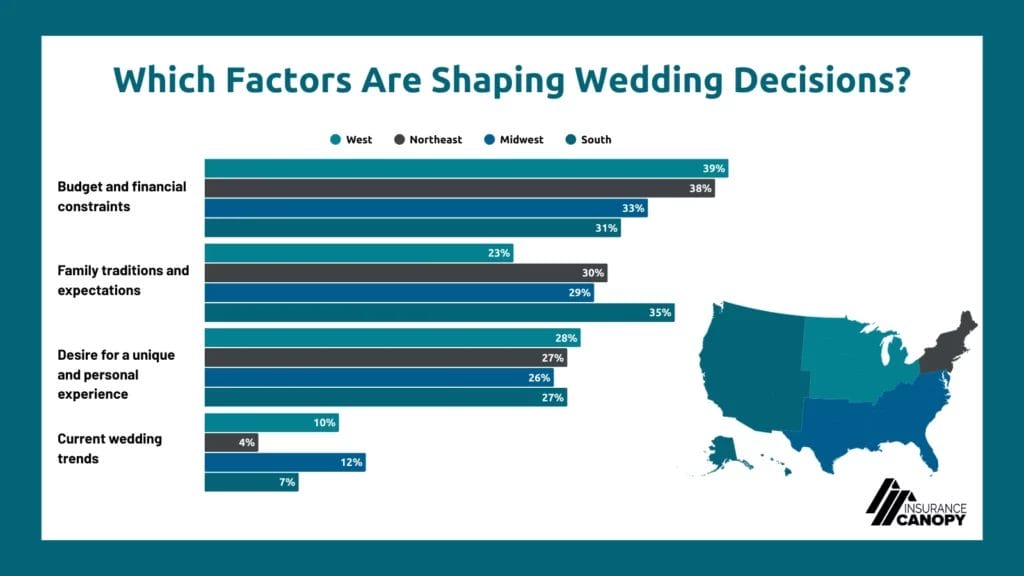
Beyond this, there are also gender differences at play. Men are equally split between budget and tradition — 33% for each. 37% of women prioritize budget above all else, but the desire for a unique experience (29%) is slightly more important than family tradition (27%).
Right now, U.S. consumer confidence in the economy is plummeting. Consumers are concerned about high prices on staple goods and the potential impact of tariffs. In this economic landscape, it’s no surprise that couples are heavily weighing their wedding budgets.
Where Are Couples Cutting Wedding Costs, and Why Do They Splurge at All?
Nationwide, couples are most likely to reduce wedding costs by trimming guest lists (52%) and being strategic with venue selection (49%).
Guest lists are less likely to be trimmed in the South (46%) and Midwest (51%). But in the West, the majority (59%) are willing to have a smaller guest list to bring costs down.
Further, 39% of baby boomers are toning down their wedding attire to save money, vs. only 20% of Gen Zers.
Though guest lists and venues dominate budget decisions, couples are also saving money by:
- Reducing entertainment costs: 43%;
- Scaling back on food and beverages: 39%;
- Cutting decoration costs: 37%;
- Toning down attire: 23%;
- Finding more affordable photographers: 20%.
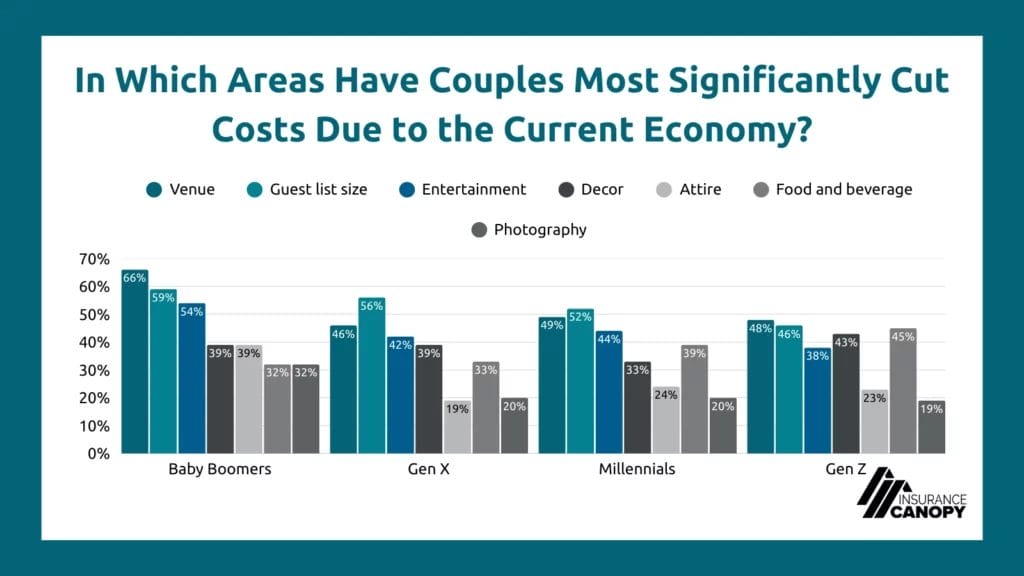
Despite a tight budget, many couples still want to splurge on their special day. Nearly 60% of men and 50% of women believe splurging on a wedding is important to create a memorable experience.
What Are Couples Splurging On?
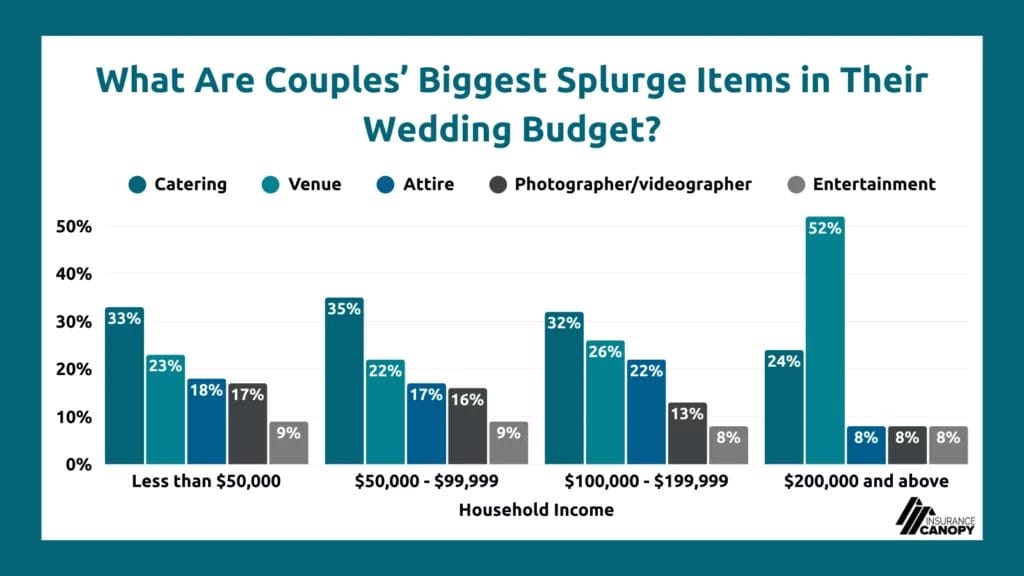
Despite rising costs, couples aren’t afraid to splurge where it matters most. More than 1 in 3 say catering is their top priority, ranking even higher than venues or entertainment.
Couples earning between $200,000 and $500,000 are the only ones to challenge this trend, as over half (52%) splurge on their venues over catering.
Gen Xers are leading the foodie charge for weddings, with 42% putting catering first. At 41%, baby boomers are right behind them. Additionally, 40% of men agree that good food is the ultimate wedding must-have.
In contrast, women prioritize lasting memories, favoring attire (22%) and professional photography or videography (15%) over food.
Not even 1 in 10 men consider their wedding attire a top spending priority.
Are Couples Choosing Open Bars or Dry Receptions?
Open bars are still the life of the party. 46% of couples say they’re the best choice for weddings, far outpacing limited bars (25%), cash bars (19%), and dry weddings (10%).
Men are especially enthusiastic, with 1 in 2 preferring an open bar, compared to 2 in 5 women.
1 in 5 couples are sticking with the standard drink menu provided by the venue or caterer. But an equal number go with featured personalized signature cocktails to make their wedding unique. Nearly half of all couples (45%) customize their menus with wine, beer, and non-alcoholic options, ensuring all guests have something delicious to drink.
1 in 2 millennials want more variety in their drink menus. They cater to people drinking less by serving non-alcoholic beers, cocktails, and sodas. In stark contrast, only 1 in 5 baby boomers cares to customize.
Beyond enjoyment, offering alcohol at a wedding impacts logistical and financial considerations. Open bars often require liquor liability insurance, bartending services, and compliance with venue regulations.
For couples weighing their options, the choice between an open bar, a limited selection, or a dry reception often depends on personal preference, financial considerations, venue restrictions, and local dram shop laws.
Are Couples Making Weddings Sustainable in 2025?
Eco-friendly weddings are becoming the norm — 89% of couples say they’re taking steps to reduce their environmental impact. But sustainability looks different across generations.
- Baby boomers favor recycled decor and invitations (37%)
- Gen X leans toward smaller guest lists (43%)
- Nearly half of millennials (47%) and Gen Z (49%) are booking eco-friendly venues
Secondhand fashion is also gaining traction: 23% of women opt for pre-worn wedding attire, compared to just 18% of men.
And in a blend of sustainability and budget-savviness, many couples are crafting DIY invitations (21%) or designing their own decorations (23%). And 8% even repurpose decor to cut down on waste.
Do Couples Prefer Personalization Over Tradition?
Personalization is now a top wedding priority for nearly every couple. 91% say making their day feel uniquely “them” matters more than tradition. But not all generations agree.
While 92% of Gen Zers embrace personalization, only 64% of baby boomers feel the same, highlighting a growing generational divide over what makes a wedding meaningful. For younger couples, it’s less about following the rules and more about rewriting them.
Which Nontraditional Wedding Elements Are Couples Embracing?
Even though personalization is almost universally prized, couples remain divided on whether to incorporate nontraditional elements into their weddings (like unique rituals or ditching the bridal party). 37% plan to do so, 43% don’t.
However, things change when considering age. 37% of Gen Z and millennials want to buck tradition. In comparison, 49% of baby boomers prefer to stick with tradition, and only 24% embrace unconventional wedding elements.
Among couples choosing to break from tradition, these trends stand out:
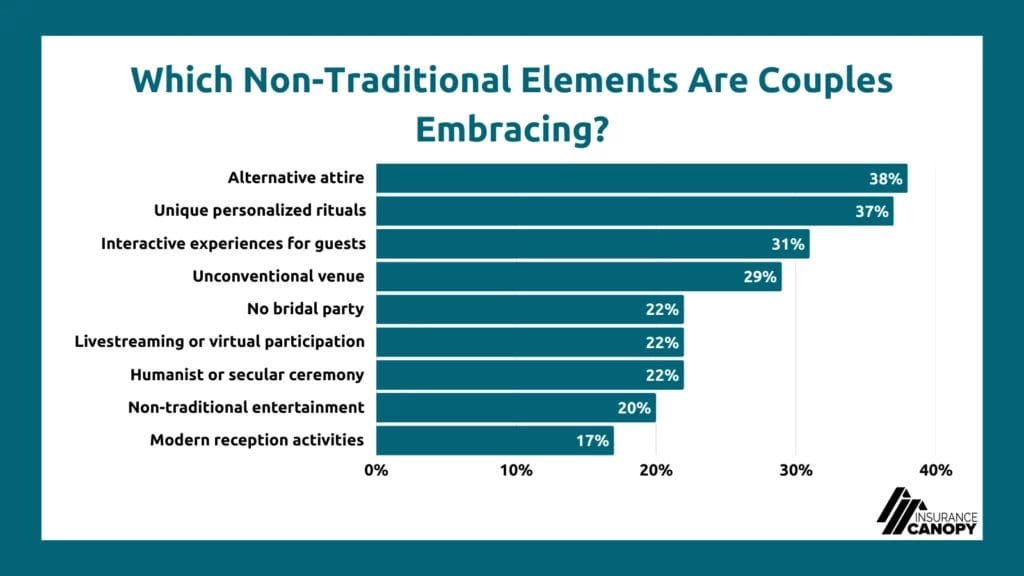
Which Wedding Traditions Are Couples Rejecting?
Today’s couples aren’t afraid to break with tradition, especially when the old ways don’t resonate. A growing number are ditching the expected in favor of more modern, meaningful alternatives.
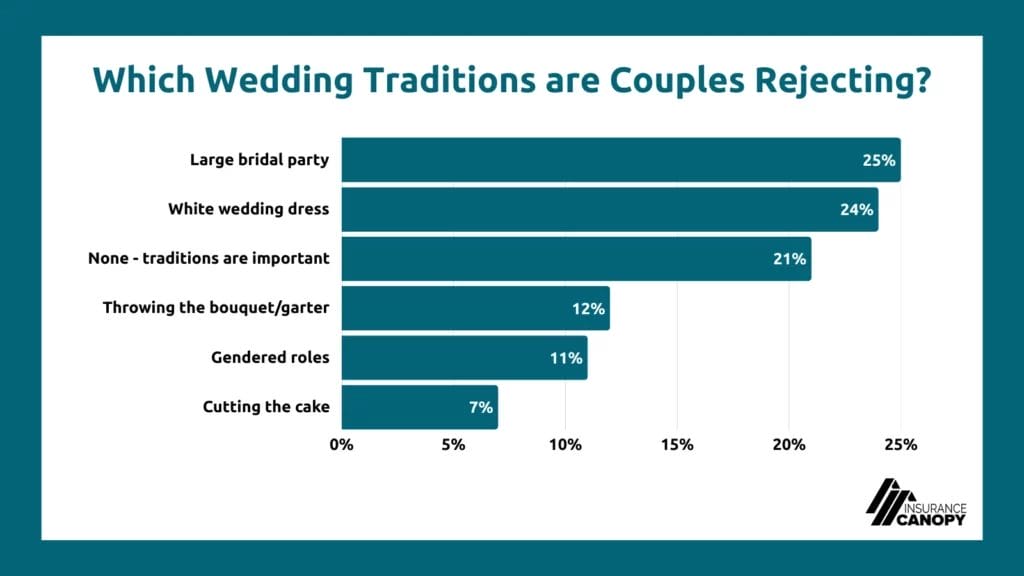
Only 5% of baby boomers find gender roles to be irrelevant in 2025. 15% of Gen Zers feel the same, making them three times as likely to ditch gendered roles in their nuptials. Despite these differences, 10% of both generations agree: cutting the cake has got to go.
As wedding traditions shift in favor of modern preferences, new style trends are emerging as well.
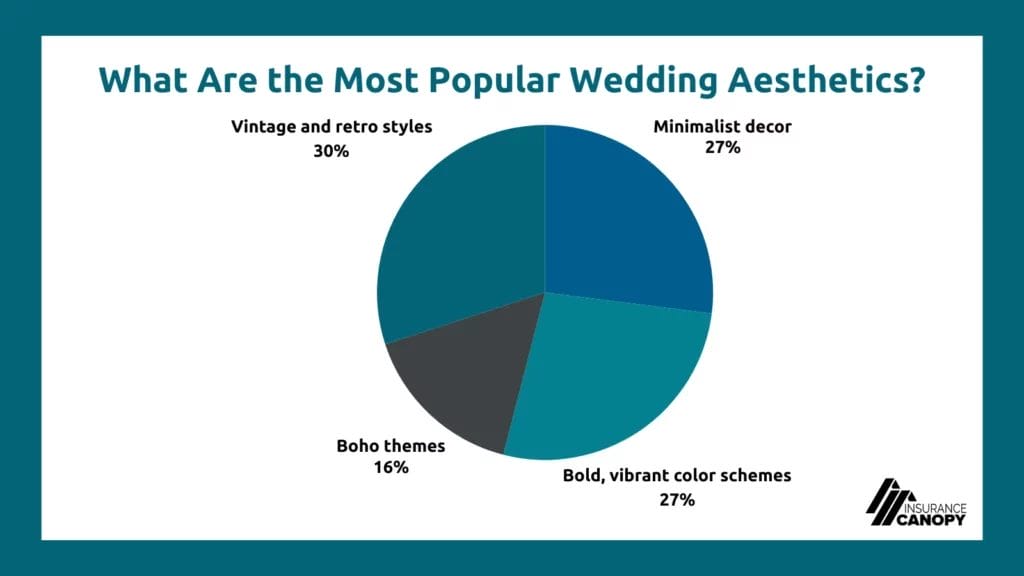
There are some regional preferences when it comes to wedding style, however. 29% of Southern couples favor weddings with bold color themes, while other regions like the Midwest (34%) and West (29%) lean toward vintage and retro styles.
How Are Couples Making Weddings More Memorable and Inclusive in 2025?
When it comes to creating lasting memories, couples are getting creative and personal. 22% of women make weddings memorable by offering personal keepsakes and favors. Men, however, prioritize unique food and drink experiences, as reflected by the 26% who plan to incorporate distinctive culinary elements.
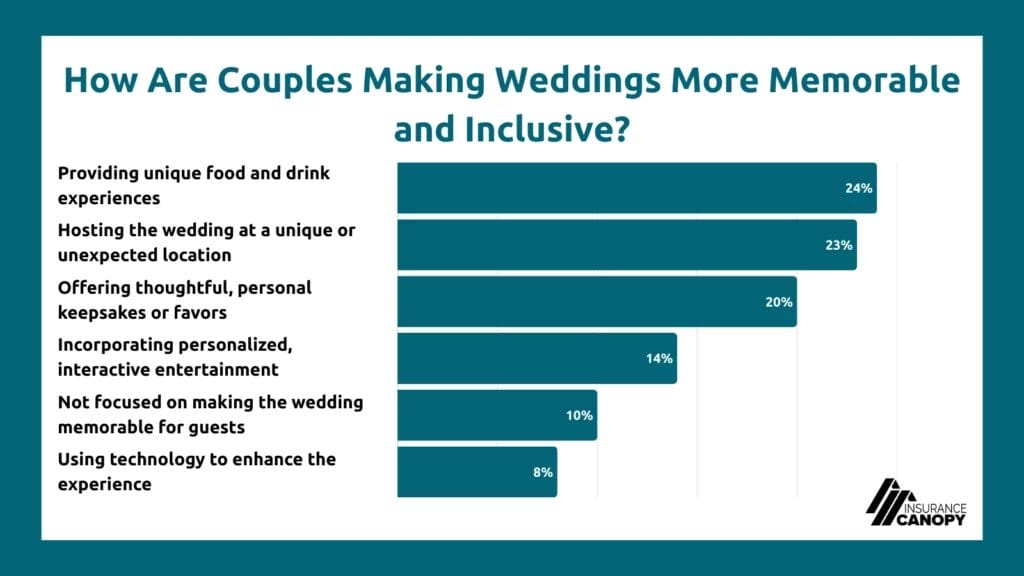
Inclusivity is also a growing priority. Nearly half of all couples (45%) ensure their venues are accessible to guests with disabilities.
There are a few other ways couples are creating a welcoming environment for all attendees:
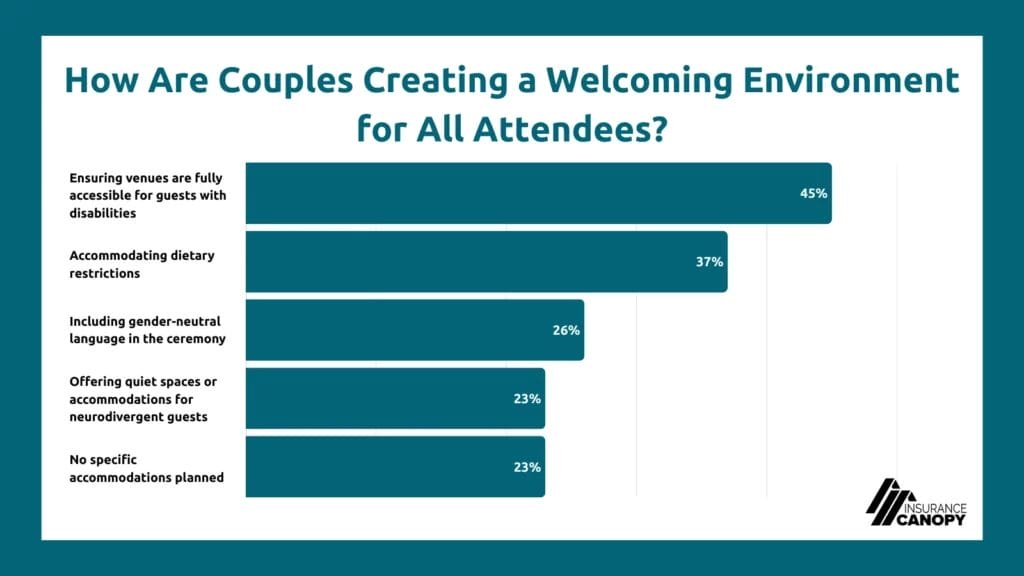
1 in 3 Gen Z couples celebrate gender neutrality during the ceremony; a mere 1 in 10 baby boomers do the same.
Further, 26% of young couples (Gen Z and millennials) are inclusive to neurodivergent guests, offering quiet spaces — more than twice the number of baby boomer couples who do so (12%).
How Are Couples Handling Emergencies and Budget Headaches?
Here’s how couples allocate funds to cover unexpected wedding expenses, such as cancellations or emergencies:

Budgeting stands out as the most prominent headache. 39% of couples identify it as their greatest challenge during wedding planning.
Today, the economic stakes are high, and many people simply can’t afford to save the money they need to deal with emergencies. This makes strict budgeting essential, especially for younger Americans who may not be as financially stable.
24% of baby boomers aren’t budgeting for emergencies on the big day. However, 92% of Gen Z and 94% of millennials set aside some funds to deal with last-minute issues that might pop up.
However, budgeting isn’t the only difficult decision couples face. Other common challenges are:

What Is the Impact of Social Media on Wedding Planning?
Social media is both a blessing and a curse for today’s couples. 82% of couples are hitting the apps for wedding inspiration, but with that comes new pressures; 17% have gone so far as to alter their plans because of social media’s influence.
- 1 in 3 couples turn to TikTok and Instagram for cost-saving wedding ideas.
- Nearly 1 in 4 couples incorporate social media trends like TikTok dances into their wedding.
- 1 in 5 couples hire dedicated social media coordinators and photographers to share real-time content from their wedding day.
- Almost 1 in 5 couples make sure their wedding is “Instagram-worthy.”
Social media is especially influential for younger couples. 1 in 3 Gen Z, millennials, and Gen X turn to platforms like TikTok and Instagram for DIY inspiration and budget-friendly hacks. But baby boomers? Only 1 in 10 say they’ve found value in social platforms when wedding planning.
Taking things a step further, 1 in 3 couples borrow ideas from celebrities and influencers when it comes to luxury touches and over-the-top wedding details. And 1 in 10 actually model their wedding after a specific influencer’s or celebrity’s big day.
How Has Social Media Made Wedding Planning More Stressful?
Social media elicits strong feelings in Americans. It’s made 34% of American couples more excited about planning their weddings, for starters. However, 23% find social media stressful, and another 13% feel both extremes.
Young couples, in particular, have mixed emotions about using social media for wedding planning, but share an overarching positive relationship with it:
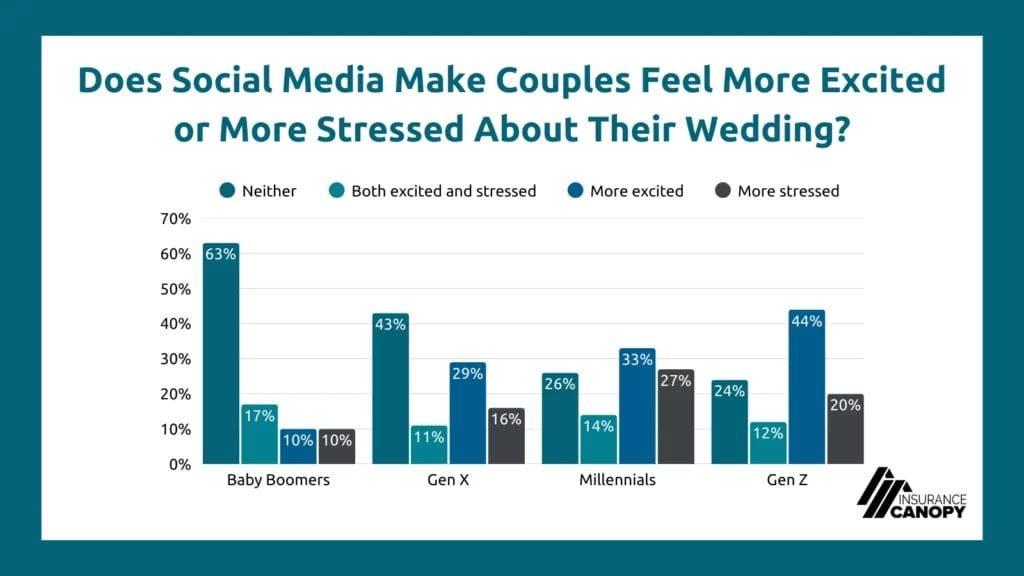
Social media’s emotional pull weakens with age. Nearly two-thirds of baby boomers (63%) say it has no emotional impact on their wedding planning, more than double the rate of Gen Z (24%) and millennials (26%).
In fact, just 1 in 10 baby boomers say social media makes them feel anything at all — whether excitement or stress — marking a sharp contrast with younger generations, who are more emotionally engaged.
How Are Couples Handling Practical Wedding Decisions?
Word of mouth is officially out. 89% of couples don’t rely on personal recommendations when choosing wedding vendors. And 93% say online reviews aren’t a key factor when choosing vendors, challenging the idea that ratings drive trust and reliability.

Interestingly, for 42% of couples earning less than $50,000 annually, price is more important than service quality.
But as couples’ incomes progress over $50,000, many more find the quality of the services they receive to be increasingly valuable. 64% of couples with incomes over $200,000 value quality as king, making this a more popular priority than factors like price and personal recommendations combined.
Couples are also more aware of the importance of vendor reliability. They recognize that a key (yet sometimes overlooked) factor is selecting wedding vendors with insurance. The added protection provides peace of mind for both couples and vendors in case of unexpected weather or accidental damage.
What Safety Considerations Are Couples Making?
Safety and comfort are growing priorities for wedding planning, but even still, party precautions vary.
More than 1 in 3 couples proactively choose venues with built-in weather contingency plans. But 1 in 5 couples admit they haven’t considered potential risks or taken any steps to manage them.
41% of baby boomer couples haven’t considered potential risks at their wedding. This is in stark contrast to the 87% of Gen Zers who have already considered which safety measures they want to implement.
When it comes to taking safety measures for their weddings, here’s what couples are doing:
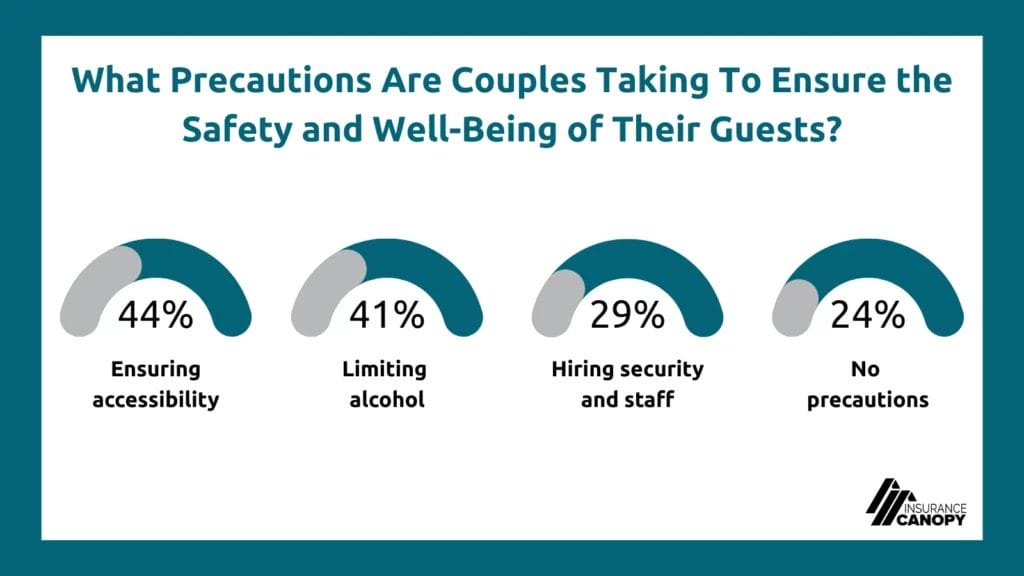
Gen Z (47%) and millennials (45%) actively prioritize accessibility and inclusivity for their guests. Gen Xers (43%) and baby boomers (39%) are more concerned with how much their guests might drink.
That said, nearly one-quarter of all couples aren’t taking any precautions whatsoever.
What Surprises Does 2025 Have in Store for Wedding Planning?
Nearly 60% of couples report that wedding planning has been more difficult than they initially anticipated. Here’s how couples’ expectations compare to reality:
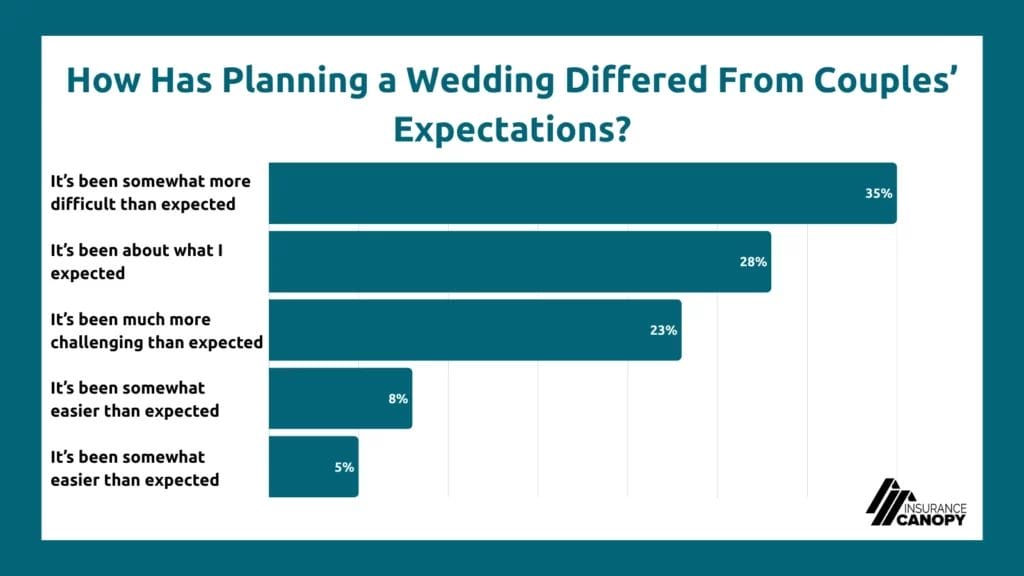
These insights reveal how the evolving nature of wedding planning — with its endless decisions, financial constraints, inclusivity concerns, and dreamy expectations — can challenge modern American couples of all ages and income levels as they work to bring their romantic visions to life.
Methodology
This survey was conducted on January 27, 2025, and included 1,000 U.S. adults currently engaged or actively planning a wedding. The survey explored trends in budgeting, vendor preferences, social media influence, and safety concerns. Demographic data allowed for analysis across regions and generations to better understand how couples are approaching weddings in 2025.
Fair Use Policy
The insights and findings from this study are available for noncommercial use, including academic research, educational projects, and personal reference. Proper attribution is required when referencing this study, and direct linking to this article is encouraged to ensure access to the full context of the findings.
For commercial use, media publication, or other professional applications, permission must be obtained from the authors. Respect for intellectual property rights and ethical citation practices is greatly appreciated.
